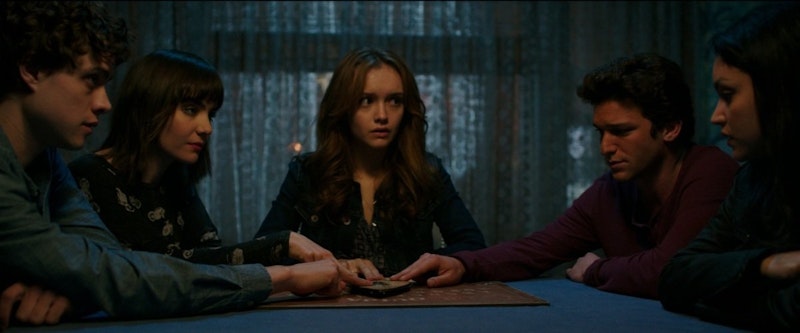This is part of a series on Blumhouse horror films. The last entry on Creep is here.
I've watched around 10 Blumhouse films for my series on the production company. Ouija (2014), which I saw last week, is unquestionably the worst. It lacks the scrappy inventiveness of Blumhouse's low-budget found footage efforts like Paranormal Activity, but it's also not particularly well-made or focused in line with slicker efforts like Upgrade or even Viral. It doesn't have a clear vision, but isn't an interesting mess either. It has no memorable characters, no memorable ideas, and indifferent acting. It's not bad enough to be funny or campy. Watching it is like staring at a dumb board for an hour and a half.
The plot is overly familiar and complicated. Debbie Galard (Shelley Hennig) is haunted by a spirit summoned through the Ouija board. She’s possessed, and hangs herself with Christmas lights. Her closest friend Laine Morrie (Olivia Cooke) is distraught and gathers other acquaintances, boyfriends, and siblings to try to speak to Debbie's spirit through the board. They end up summoning a spirit named Doris Zander, who tells them her evil mother is pursuing her. Some of Laine's friends are killed before she realizes that mother is the good spirit and Doris is the bad spirit. Laine and her sister Sarah (Ana Coto) then find Doris' body in the attic of her house and burn it and the board. Order is restored, and the film limps to an underwhelming halt.
The kids are doomed when the board summons Doris instead of Debbie—and that's where the movie gets in trouble as well. To the extent that the film has any emotional content, it's the friendship between Debbie and Laine, and Laine's grief at her friend's death.
Suicide and grief can be the basis for a strong horror narrative. The second season of the television anthology Channel Zero, titled No End House (2017) managed an effective, creepy, and sad meditation on suicide and grief, with the departed spirit of a beloved comfort and a hungry monster ready to swallow the grieving. The new Netflix series, The Haunting of Hill House, is a sprawling story about the long term corroding terror of suicide on one family.
Ouija is more simple-minded. Laine and Debbie's relationship is presented as idyllic, and Debbie herself is pure, blonde, and good, in life and in death. The evil and anxiety in the film is entirely displaced; all the feelings of resentment at a friend dying are shifted over onto some other anonymous spirit. Laine doesn't have any connection to Doris Zander; she's just the villain of the piece, an anonymous bogeywoman who can be safely exorcized without any particular regrets. Doris is also responsible for Debbie's death, so the potential anger and confusion tied to a friend's suicide is neatly erased. Debbie's spirit even pops back up to lend a hand to banish Doris at a key moment.
The film pretends it's messing with the boundaries between living and dead, but really it's working to keep everything neatly on its own side of the board. Debbie is everything good; Doris everything bad. The Ouija gives Laine comfort and closure by providing her with a villain who she can blame for her friend's suicide.
The Ouija board's initial message to Laine and her buddies is a creepily cheerful, "Hi, friend." It's the most effective bit of an ineffectual film, in part because of its ambiguity. Is Debbie, now dead, still a loved one? What painful spaces does suicide open in a relationship? A friend, now dead, is an uncanny companion, a source of both comfort and fear. Ouija could’ve been a movie about that. But instead it chose to summon a different, blander spirit.

